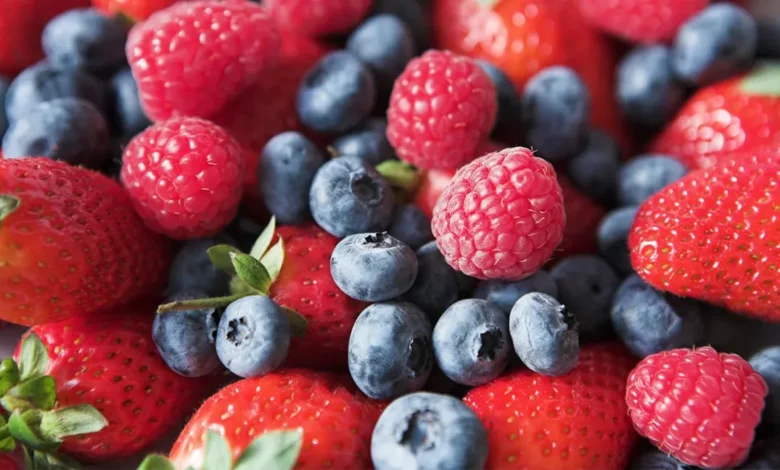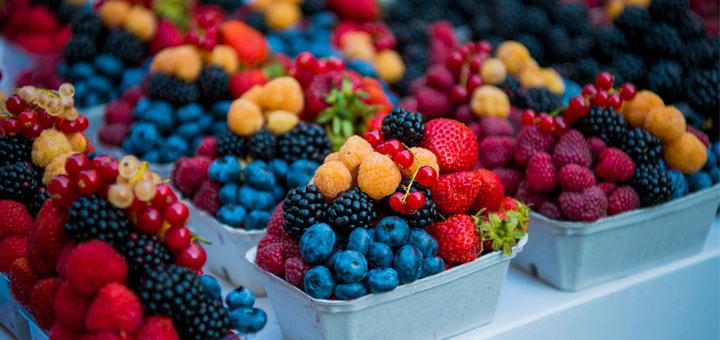
Top 14 Healthiest Berries You Can Eat – Berries are some of the most nutritious and antioxidant-rich foods you can eat. Packed with vitamins, minerals, and plant compounds, berries offer an array of health benefits. From boosting your immune system to protecting your heart and brain health, adding more berries to your diet is a smart choice. In this article, we will explore the top 15 healthiest berries and why you should include them in your meals and snacks.Top 14 Healthiest Berries You Can Eat
The Top 14 Healthiest Berries You Can Eat Are:

1. Blueberries
Blueberries top the list as one of the most nutrient-dense berries you can eat. Native to North America, these small, deep purple berries are brimming with manganese, vitamin K, and copper. Blueberries are also rich in anthocyanins, powerful antioxidants that give blueberries their deep color and provide anti-inflammatory and anti-aging effects. Research shows that eating blueberries may help improve memory, reduce blood pressure, and decrease LDL cholesterol. Add fresh or frozen blueberries to yogurt, oatmeal, or smoothies.
👉 Relocate to Canada Today!
Live, Study and Work in Canada. No Payment is Required! Hurry Now click here to Apply >> Immigrate to CanadaRead Also: Top 15 Foods for Skin and Hair Benefits
2. Strawberries
Juicy, red strawberries are an excellent source of vitamin C and manganese. One cup provides over 100% of your daily vitamin C needs. The fiber, potassium, folate, and phytochemicals in strawberries support heart health by reducing inflammation and cholesterol levels. The distinctive red color comes from anthocyanins, which may help control blood sugar and insulin levels. Enjoy fresh strawberries as a snack, in salads, or blended into smoothies.
3. Raspberries
Sweet, delicate raspberries contain ellagitannins, antioxidant compounds that may help fight cancer. Raspberries are very high in fiber, providing 8 grams per cup. Their polyphenols and anthocyanins offer anti-inflammatory effects that may reduce arthritis symptoms. Raspberries make tasty additions to oatmeal, yogurt, salads, or desserts.Good morning My Love Message
4. Blackberries
Juicy blackberries are rich in vitamin C, manganese, and vitamin K. Their high antioxidant content provides anti-inflammatory benefits that may help prevent cancer and diabetes. The anthocyanins in blackberries also support brain function and healthy aging. Use fresh or frozen blackberries in smoothies, pancakes, or parfaits for a nutritional boost.
Read Also: 15 Facts About the Amazon Rainforest Animals
5. Goji Berries
Also known as wolfberries, goji berries grow on a shrub native to China. Dried goji berries contain high levels of antioxidants, particularly zeaxanthin, which protects eye health. Goji berries also provide vitamin C, fiber, iron, and vitamin A. Compounds in goji berries may help enhance immune function and reduce blood sugar, blood pressure, and cholesterol levels. Enjoy goji berries in trail mixes, oatmeal, or smoothie bowls.
6. Cranberries
Tart, bright red cranberries are synonymous with Thanksgiving. But cranberry health benefits extend far beyond holiday meals. Cranberries contain proanthocyanidins, linked to improved urinary tract and heart health. These compounds prevent bacteria from adhering to the urinary tract, reducing the risk of UTIs. Cranberries support oral health by fighting bacteria that cause cavities and gum disease. Dried cranberries make nutritious additions to salads, grain bowls, trail mixes, and baked goods.Information guide Nigeria
7. Acai Berries
Exotic acai berries grow on acai palm trees in the Amazon rainforest. Small and deep purple, acai berries get their dramatic color from anthocyanins. Acai packs powerful antioxidants linked to anti-aging, anticancer, anti–inflammatory, and cholesterol-lowering effects. Acai may also boost brain function. Blend acai berry powder into smoothies or enjoy it as a juice or bowl topped with fruit and granola.Romantic love message
👉 Relocate to Canada Today!
Live, Study and Work in Canada. No Payment is Required! Hurry Now click here to Apply >> Immigrate to Canada8. Black Currants
Black currants are small, dark berries that grow on shrubs and provide a tart, earthy flavor. Rich in vitamin C and anthocyanins, black currants have double the antioxidants of blueberries. They also contain gamma-linolenic acid (GLA), a type of omega-6 fatty acid with anti-inflammatory activity. Black currants may help reduce arthritis pain, regulate blood pressure, and support brain health. Eat them fresh, in jams, or try black currant juice.
Read Also: Top 15 Schools of Health in Northern Nigeria
9. Red and Black Raspberries
Like their better-known red raspberry cousins, black raspberries and other less common raspberry varieties offer stellar nutrition. Red raspberries come in many shades from pink to maroon, while black raspberries have a deep purple-red hue. All raspberries offer powerful antioxidants like anthocyanins, ellagitannins, gallic acid, and quercetin. These compounds provide anti-cancer, anti-inflammatory, and neuroprotective effects. Use these antioxidant-rich berries anywhere you would enjoy traditional red raspberries.NYSC Portal
10. Elderberries
Elderberry shrubs produce tiny deep purple berries bursting with vitamin C and flavonoids like anthocyanins. Elderberries have long been used as cold and flu remedies. Compounds in elderberries may help reduce swelling in mucous membranes and block viruses from penetrating cells. Elderberries fight inflammation, bacteria, and viruses that can cause illness. Try elderberries in jams, juices, teas, and immune-boosting syrups.
11. Chokeberries
Over 15 species of chokeberries exist, including aronia berries and black chokeberries. Sour and bitter-tasting, raw chokeberries are best enjoyed dried, juiced, or infused into jellies and teas. Chokeberries offer some of the highest antioxidant capacities among fruits, packing in anthocyanins, proanthocyanidins, chlorogenic acid, and other polyphenols. As a result, chokeberries provide cardioprotective, anti-diabetic, anti-cancer and neuroprotective benefits.
12. Sea Buckthorn Berries
This orange-yellow berry grows on a shrub native to Asia and Europe. Sea buckthorn berries are rich in vitamin C, vitamin E, flavonoids, and healthy fats. Powerful anti-inflammatory and antioxidant properties make sea buckthorn effective against diabetes, heart disease, cancer, ulcers, and cognitive disorders. Sea buckthorn may also boost immunity and fight infections. Enjoy these sour berries in juice blends, teas, and jams.JAMB portal
Read Also: 15 Best Foods for Digestive Health
13. Saskatoon Berries
Also called serviceberries or juneberries, saskatoon berries resemble blueberries but offer a richer flavor. Native to North America, saskatoon berries contain manganese, magnesium, iron, calcium, potassium, copper, and carotene. Their array of antioxidants and anti-inflammatory nutrients make them beneficial for heart health, blood sugar control, gut health, and cancer prevention. Eat them fresh or use them like blueberries.
14. Aronia Berries
Aronia berries, also known as chokeberries, provide one of the highest antioxidant capacities of all fruits. Intensely pigmented with anthocyanins, aronia berries offer potent anti-inflammatory and anti-diabetic properties. Research suggests they may help control cholesterol levels, blood pressure, and digestive health. Aronia berries have an astringent, bitter taste best enjoyed dried or juiced rather than fresh. Mix aronia berry powder into smoothies for a nutrition boost.Romantic love message
Read Also: Top 15 Most Watched Nigerian Video on YouTube
Conclusion
Berries of all kinds provide a powerhouse of nutrition and disease-fighting plant compounds like anthocyanins and polyphenols. Berry phytochemicals show promising abilities to combat cancer, heart disease, diabetes, cognitive decline, and inflammation. Their vibrant colors represent the diverse combination of vitamins, minerals, and antioxidants they supply. Just one cup a day of mixed berries can significantly improve your health, so enjoy their delicious flavors and include them in your diet regularly.
Check JAMB Result
Check and Confirm: How much is Dollar to Naira







